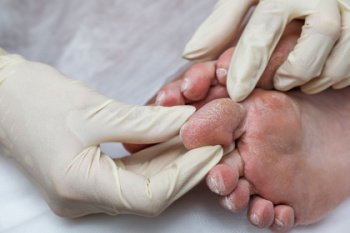
Debridement of diabetic wounds is a critical procedure in wound care management, particularly for patients with diabetic foot ulcers. Diabetic wounds often heal slowly due to poor circulation and high blood sugar levels, leading to the buildup of dead or infected tissue that can hinder the healing process. Debridement involves the removal of this dead tissue, allowing healthy tissue to grow and promoting faster healing. This procedure reduces the risk of infection by eliminating bacterial growth in the wound, which can otherwise lead to more severe complications, including amputation. Debridement also improves the effectiveness of other treatments, such as dressings and medications, by creating a cleaner environment for wound healing. If you have diabetic foot wounds, it is strongly suggested that you visit a podiatrist to see if regular debridement sessions, in addition to proper diabetes management, can help prevent serious complications related to your condition.
Wound care is an important part in dealing with diabetes. If you have diabetes and a foot wound or would like more information about wound care for diabetics, consult with Richard M. Allen, DPM from Idaho. our doctor will assess your condition and provide you with quality foot and ankle treatment.
What Is Wound Care?
Wound care is the practice of taking proper care of a wound. This can range from the smallest to the largest of wounds. While everyone can benefit from proper wound care, it is much more important for diabetics. Diabetics often suffer from poor blood circulation which causes wounds to heal much slower than they would in a non-diabetic.
What Is the Importance of Wound Care?
While it may not seem apparent with small ulcers on the foot, for diabetics, any size ulcer can become infected. Diabetics often also suffer from neuropathy, or nerve loss. This means they might not even feel when they have an ulcer on their foot. If the wound becomes severely infected, amputation may be necessary. Therefore, it is of the upmost importance to properly care for any and all foot wounds.
How to Care for Wounds
The best way to care for foot wounds is to prevent them. For diabetics, this means daily inspections of the feet for any signs of abnormalities or ulcers. It is also recommended to see a podiatrist several times a year for a foot inspection. If you do have an ulcer, run the wound under water to clear dirt from the wound; then apply antibiotic ointment to the wound and cover with a bandage. Bandages should be changed daily and keeping pressure off the wound is smart. It is advised to see a podiatrist, who can keep an eye on it.
If you have any questions, please feel free to contact our office located in Lewiston, ID . We offer the newest diagnostic and treatment technologies for all your foot care needs.
